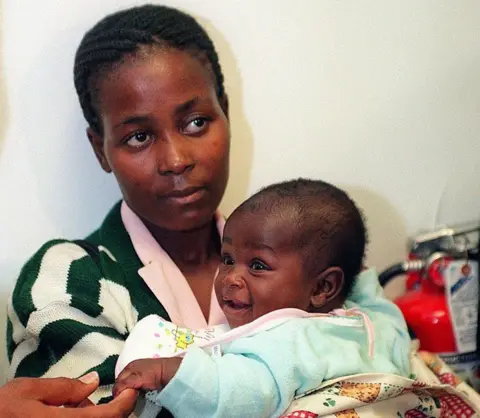Holy moly. Look at these phones. The floor is just littered with SIM cards. We’re in Myanmar. Only weeks after rebel fighters took control of a cyberscam center near the border with Thailand. For years, Chinese criminals have used ordinary office spaces like this in the middle of the jungle to target Americans in elaborate online fraud. OK, here we are, the nerve center of this multibillion-dollar industry that is scamming people all across the world. More than 3,000 people from dozens of countries were once employed here, joining an industry that has proliferated during Myanmar’s civil war. There’s just row after row of monitors. Looks just like a normal office park. This is all evidence of scamming. Many of the workers fled, leaving behind documents and records detailing the scams. This looks like a receipt. There were also piles of electronic equipment, the main tools of their trade. Here are AT&T SIM cards. So you can just pretend that you’re calling from the United States. The scammers would act like potential love interests and send messages to their targets on social media. They would target lonely hearts in the United States and pretend to be beautiful, young Asian women who were interested in just making a connection with somebody. As their relationships with their victims grew closer, the scammers would then move the conversation to a video call. This is a video call room, and you can see that they’ve got a fake background and they’ve got fake flowers, some books. This looks like a book, but it’s actually just a box. When victims would send in large amounts of money, the scammers would celebrate. When you make $5,000 bucks, you hit the gong, and then when you make $50,000 bucks, you hit this very large drum. And in between is the god of wealth. [explosion] Jesus Christ, it’s close. Our visit was punctuated by the thud of mortar rounds that forced us to seek cover. “Hurry, hurry.” But many of the Chinese workers still living in the complex seemed unfazed about being in the middle of a war zone. We tried to speak to some of them during our visit to the compound. These are the scammers who are not willing to leave. Some said they were lured by fake job offers and forced to work in the scam industry. If they go home to China, they said, they’ll likely be arrested. So for now, their best hope is to find another job here in war-torn Myanmar.
BBC attempts to have Trump’s $10 billion lawsuit thrown out
BBC seeks to have Trump’s $10 billion lawsuit dismissed
Heba Muraisi, UK hunger striker, reflects on thoughts of her potential death amid Israel-Palestine conflict
London, United Kingdom – Heba Muraisi, a Palestine Action-affiliated activist who has refused food for 72 days in prison, has told Al Jazeera that she “no longer feels hunger”, is suffering with pain and knows that her death may be imminent.
The 31-year-old responded to questions via a friend who regularly visits her in New Hall prison in northern England.
Recommended Stories
list of 4 itemsend of list
“Physically, I am deteriorating as the days go by. I no longer feel hunger, I feel pain,” Muraisi said. “I don’t think about my life, I think about how or when I could die, but despite this, mentally I’ve never been stronger, more determined and sure, and most importantly, I feel calm and a great sense of ease.”
Muraisi was arrested on November 19, 2024, over her alleged involvement in a break-in months earlier at the UK subsidiary of the Israeli defence firm Elbit Systems in Bristol.
If she survives, she will have spent at least a year and a half in prison before her trial date, which is reportedly due no earlier than June this year – well beyond the UK’s usual six-month pre-trial detention limit.
She is the longest-fasting hunger striker of a group of eight activists who have joined the rolling protest since early November. Four are currently refusing food, including Muraisi and Kamran Ahmed, a 28-year-old who has not eaten for more than two months.
“Even though the risks may be lifelong consequences or a devastating end, I think it’s important to fight for justice and for freedom,” she told Al Jazeera.
‘I can no longer read like how I used to’
In recent weeks, the British media has intensified its coverage of the prison protest, said to be the largest coordinated hunger strike in British history since 1981, when Irish Republican inmates were led by Bobby Sands. Sands died on the 66th day of his protest, becoming a symbol of the Irish Republican cause. Nine others also died of starvation.
“I’m choosing to continue this because for the first time in 15 months, I’m finally being heard,” said Muraisi.
A Londoner of Yemeni origin who had worked as a florist and lifeguard, Muraisi is reportedly suffering from muscle spasms, breathlessness, severe pain and a low white blood cell count. She has been admitted to hospital three times over the past nine weeks.
At times, she has lost the ability to speak, and her memory is declining, friends who have recently visited her have said.
“Since concentrating has become gradually more difficult, I can no longer read like how I used to, so now I listen to the radio a lot,” she told Al Jazeera via the intermediary. “I love music, and it’s a shame I can’t get the CDs I want, but nonetheless I’m grateful to have songs playing.”
Last week, an emergency physician who is advising the hunger strikers told Al Jazeera that he believes Muraisi and Ahmed have reached a critical phase in which death and irreversible health damage are increasingly likely.
Ahmed’s weight has dropped to 56kg from the healthy 74kg he entered jail at; he is suffering from cardiac atrophy, or heart shrinkage, chest pain and twitching, according to his sister, Shahmina Alam. His speech is slurred, he is now partially deaf in his left ear, and his heart rate has intermittently fallen below 40bpm in recent days, she said.
The group of hunger striking activists are among 29 remand prisoners being held in various jails over their alleged involvement in the Bristol incident and a break-in at the Royal Air Force (RAF) base in Oxfordshire. They deny the charges against them.
Their protest demands include bail, the right to a fair trial and the de-proscription of Palestine Action, which the UK in July designated a “terrorist organisation”, putting it on par with ISIL (ISIS) and al-Qaeda. They are calling for all Elbit sites to be closed in the UK and seek an end to what they call censorship in prison, accusing authorities of withholding mail, calls and books.
Muraisi has also asked to be returned to HMP Bronzefield in Surrey as HMP New Hall, where she was moved in October, is about 200 miles away – much further from home.
Palestine Action, which says it supports direct action without violence and accuses the UK government of complicity in Israel’s atrocities, is fighting against the proscription in courts as six of those charged in the Bristol case are currently on trial.
Asked if she can access news about Palestine from jail, Muraisi, who has family members in Gaza, accused prison officials of “systematically” blocking articles and newspapers “sent in for me”.
“Anything Palestine-related, including the book We Are Not Numbers [an anthology of emerging writers from Gaza], has been deemed inappropriate. I rely on those I call for news,” she said.
At the time of publishing, neither the UK Ministry of Justice nor New Hall prison had responded to Al Jazeera’s request for comment.
Malaysia’s largest construction conglomerate possible as two Southeast Asia 500 companies consider merging
Malaysian construction giant Sunway has announced a $2.7 billion share-and-cash takeover of competitor IJM Corporation, which would bring together two of Malaysia’s largest property developers.
The proposed merger, announced on Jan. 12 by Sunway president Anuar Taib, will form an entity with a combined market capitalization of $11.7 billion, surpassing current leader Gamuda Berhad, valued at $7.2 billion.
If the merger goes through, it will create one of Malaysia’s largest property developers as the Southeast Asian country’s construction market heats up amid a data center and infrastructure boom.
Both Sunway and IJM are on Fortune’s Southeast Asia 500 ranking, which lists the region’s largest companies by revenue. Sunway, at No. 190, generated $1.7 billion in revenue in 2024; IJM, at No. 228, generated $1.3 billion. A merged Sunway-IJM would have 2024 revenue totaling $3 billion, lifting it to No. 120—overtaking Gamuda.
In a stock filing in Bursa Malaysia, the country’s stock exchange, Sunway said the merger would “position the enlarged Sunway Group to pursue mega projects such as development of large-scale data centers, industrial facilities and public infrastructure projects.”
Malaysia is currently undergoing a boom in data center construction, as regional demand for AI and cloud computing services surge. In 2024, industry consultant DC Byte found that the country was Asia-Pacific’s fastest growing market for data centers.
Under the conditional takeover bid, Sunway is proposing to acquire IJM at $0.78 a share—15% higher than its 2025 closing price of $0.68 a share. Shareholders of IJM are being offered 10% in cash and 90% in newly-issued Sunway shares.
IJM shares rose 2.9% on Tuesday; Sunway shares are up just 0.2%. Trading in both companies’ shares were suspended on Monday pending the merger announcement. Sunway’s shares are up almost 25% over the past 12 months, ahead of Malaysia’s benchmark FTSE Bursa Malaysia KLCI index.
Fortune has reached out to Sunway for further comment.
A history of developments
Sunway is a family-run conglomerate founded in 1974 by Malaysian tycoon Jeffrey Cheah, who is still its key shareholder. The firm is famous for its “build-own-operate” business model and slew of diverse properties including the Sunway Lagoon theme park, Sunway Medical Center, and two educational institutions, Sunway College and Sunway University.
IJM was established in 1983, via the merger of three Malaysian construction firms: IGB Construction, Jurutama, and Mudajaya. The firm’s assortment of businesses span construction, property and infrastructure. It built major roads and bridges in Malaysia, including the West Coast Expressway, an interstate highway running along the west coast of the country.
In a stock filing, Sunway’s Taib said the deal would create “synergistic value”, allowing both firms to improve margins through economies of scale and access a broader pool of talent and technical expertise. The enlarged Sunway Group will also have an expanded landbank of 2,300 hectares, according to the filing.
Tyson Fury Reveals the Only Heavyweight Who Can Defeat Usyk: “Exclusive Scoop”

Tyson Fury came up short in his attempts to be the first man to defeat Oleksandr Usyk.
The pair have squared off on two occasions, with the first of them coming in May 2024, as the Ukrainian came out on top to become undisputed heavyweight champion.
A rematch took place for three of those world titles in December of that same year, and once again it was Usyk who was victorious, leading Fury to announce his retirement from the sport.
A number of others have tried and failed against Usyk, as he has claimed wins against fighters such as Anthony Joshua and Daniel Dubois, but Fury believes there is one man out there who can defeat the current heavyweight king.
Posting on social media, ‘The Gypsy King’ backed Moses Itauma to be the one who has what it takes to beat Usyk.
“I keep getting asked about young Moses Itauma fighting Oleksandr Usyk and fighting all the other big names.
“Boxing is a young man’s game. It waits for nobody. So here is the opinion, and you heard it here first.
“Moses Itauma will wreck all them old men out of the division. Usyk, AJ, Miller. Whoever there is that’s old. Zhang, whoever else the f*** there is, Luis Ortiz. All these big names of the past. Even the man who took my belts. Usyk, Moses will wreck him because it’s a young man versus an old man. And an old man can’t mess with a young man.”
Itauma has an unbeaten record of 13-0, 11 of those wins coming by knockout, and at 21-years-old is being tipped by many to be the future of the sport, with Usyk himself praising the youngster.
He was set to return to action on January 24 against Jermaine Franklin, but the event has been pushed back until March after Itauma suffered an injury in training.
As for Fury, he is scheduled to end his latest retirement and compete again in 2026, potentially hoping to set up another bout with Usyk.
‘Miracle baby’ who survived being born in a tree above Mozambique floodwaters tragically passes away at the age of 25
 SABC
SABCShe was seen as a “miracle baby” after being born in a tree which her mother had climbed to escape flooding, but nearly 26 years on Mozambican Rosita Salvador Mabuiango has died after a long illness, her sister told the BBC.
The sight of the newborn and her mother being winched to safety by helicopter amid the deluged landscape became a defining image of the floods of 2000 – Mozambique’s worst ever.
Reflecting on the life of Rosita, also known as Rosita Pedro, President Daniel Chapo described her as a symbol for girls in the country.
In February 2000, hundreds died and hundreds of thousands of others were forced from their homes after the Limpopo river burst its banks in southern Mozambique.
 SABC
SABCRosita’s mother, Carolina Cecilia Chirindza, was one of those caught up in the crisis.
“It was a Sunday afternoon about four o’clock, and the waters began rising,” the Red Cross quoted her as saying later in 2000 about what happened that February.
“The water was coming right up to the house, and was getting stronger and stronger, so like everyone else in the village, we headed for the trees.
“I put my two small children on my back and tried to climb up. It was very difficult.
“There were 15 of us all together, and we were there for four days. We prayed and prayed.
“We had nothing to eat, and the children cried and cried, but we could do nothing for them.”
In the early hours of Wednesday morning, Carolina went into labour and shortly afterwards she and the newborn were spotted by a South African military helicopter that was helping in the rescue operations.
The Guardian newspaper later reported that while Carolina was giving birth her mother-in-law held a capulana (sarong) under her, to ensure that the baby did not fall into the floodwater. Rosita was still attached to her mother through the umbilical cord when they were found, reports said.
“I think my baby is different from the other babies in that she was born in a tree and in that it was God’s will for her to live and for her to get through this situation,” Carolina said later.
The two became symbols of the aftermath of the disaster, and they travelled to the US later in 2000 to speak to Congress and help raise awareness about what had happened.
 AFP via Getty Images
AFP via Getty ImagesOn Monday, confirming the news of Rosita’s death at 25, her sister Celia Salvador told the BBC that she had “passed away after a prolonged illness. I’m extremely sad. She died of an illness I am unable to explain what it was.”
According to other family sources, Rosita had been battling against the blood disorder anaemia for years. As a result of the worsening of her condition, she had been in hospital for more than two weeks, where she eventually died on Monday morning.
Rosita’s mother also told a local TV station that in addition to anaemia, she was suffering from tuberculosis.
“My God. Very bad news. My condolences to the bereaved family,” the president told the BBC.
“She was a symbol for girls in Mozambique. That’s why, I extend my condolences to all the Mozambican people, especially to Mozambican girls.”
Rosita grew up with her family and graduated from high school in the same rural area – Chibuto – where she was born. She herself had a daughter five years ago.
Her family has said that after high school, Rosita had failed to get a scholarship to study petrochemical engineering even though the government had promised to fund her studies from primary to higher education.
Political analyst Charles Mangwiro described her death as a “wake-up call for the government to improve service delivery in the entire health system in the country.
“You cannot expect to survive when health professionals complain every day about unpaid salaries for months and about the shortage of essentials like protective materials and antibiotics.”
Despite the recruitment of more health workers in recent years, analysts continue to describe an overstretched health system short of basic drugs and equipment.
Chibuto Mayor Henriques Machava told the press that conversations were under way with the family to formalise the funeral arrangements, which, according to him, would be taken care of by the municipality.
 Getty Images/BBC
Getty Images/BBCDigital Twin of F-35 Readies US Navy for Drone Warfare
As combat drones continue to move from the laboratory to the battlefield, the US Navy is exploring how to use a digitally simulated F-35 Lightning II aircraft to develop new tactics to go with the new technology.
At the Naval Air Warfare Center Aircraft Division’s (NAWCAD) Joint Simulation Environment at Naval Air Station Patuxent River, Maryland, a test pilot sits in the cockpit of an F-35 without the actual F-35. Surrounded by advanced view screens providing highly realistic images for an array of virtual combat scenarios.
Drones have gone well beyond prophecy and promise, as they are already revolutionizing warfare faster than anyone expected. However, it’s still early days with many advances still to be rolled out. Not the least of these are the Loyal Wingman jet-propelled drones with performance comparable to the piloted fighter planes they are expected to serve alongside.
US Air Force
With these combat drones on the horizon, the US Navy has no desire to fall into the old trap of having a new weapon in its arsenal and no idea of how to use it.
It’s a story as old as the airplane itself. When the First World War broke out, heavier-than-air flight was only nine years old. The fledgling air forces could fly over the battlefields and penetrate deep into enemy territory without opposition, but neither the pilots nor commanders had any concept of the new technology’s potential or how to put it to most effective use.
The result was months of experimentation and missteps, with the aircraft being first used only for reconnaissance – and pilots throwing bricks at one another – until one day an Austro-Hungarian pilot emptied a revolver at his Serbian counterpart without effect. From then on, a crude arms race developed as pilots learned how to fight with their planes as well as fly them.

Samuel King Jr/US Air Force
It’s a lesson that’s had to be learned and relearned over the last century. In the decades after the Second World War, designers kept removing the machine guns from the new jet fighters only for the pilots to come back in short order, telling them to put them back. It was all part of the process of learning how to adapt tactics to jets, supersonic speed, missiles, smart bombs, radar, and now, AI, lasers, and hypersonics.
Along with all this are the combat drones being developed by countries all over the world. It’s easy to think of these as just robotic fighter planes that operate without a pilot aboard, but they are much more than that. They have their own unique strengths and weaknesses. In addition, this is about more than just a new airframe. It’s about integrating into a whole new way of organizing military operations.
That means developing new tactics to meet the new situation.

Staff Sgt. Kaylee Dubois/US Air Force
The US Navy is particularly keen on dealing with tactics as soon as possible because where the US Air Force is taking an incremental approach to combat drones focusing on air-to-air combat, the Navy is putting its money on a multi-role capability. This includes surface attack and intelligence, to fill the gaps in the carrier air wing’s current reach.
To this end, the Navy is using the Joint Simulation Environment (JSE) as a testing sandbox. Though it may look like the sort of simulators that have been around for decades, this is more like a digital twin of contested airspaces that the pilot and their wingman will encounter in the real world.
One example of how this works is that the JSE allows pilots to fly many more sorties in a week than they could in a year on live ranges without sacrificing the necessary realism. In fact, the realism is a bit better because the live ranges are increasingly unable to produce the density of modern electronic warfare and surface-to-air missile threats. Added to this is the JSE’s capacity to integrate with the E-2D Advanced Hawkeye and EA-18G Command and Control aircraft, which are also able to manage drone swarms as part of a unified, multi-layer offense.

Tech. Sgt. Nicolas Myers/US Air Force
Basically, what these new tactics will revolve around is the fact that an F-35 can cost up to US$120 million per plane with the pilot representing an investment of up to $13.5 million for just training. With modern air wings so small, the loss of even one plane and pilot is a major tactical setback that is far better avoided.
Another major factor is that future fighter pilots will be less dog-fighters than mission commanders with authority over drones with a high level of autonomy. They won’t be flying the drones by remote control. The drones will do this themselves. The pilots will simply assign tasks like “recon” or “suppress air defenses” and the drones will figure out the rest.
Essentially, the drones will act as force multipliers that are much cheaper than piloted aircraft. Costing “only” about $10 million each, these drones may one day allow carriers to deploy 40% more warplanes than before with the carrier flight decks redesigned to handle much greater traffic and keeping the human and machine planes separate when it comes to taking off and landing.
It’s still early days as to what these new tactics will look like, but the most common one will probably be to keep the carrier as far from the fighting as possible with the drones in the lead and the fighters behind acting as commanders and a reserve for attacking very high value targets. The drones will provide sensor data and most of the armament while the F-35 will remain silent and carry fewer arms to maintain a high degree of stealth.
Of course, one obvious question is, why have the fighter there at all and why the F-35?
Okay, that’s two questions.
The F-35 is the plane of choice because it’s the only one with the advanced systems to act as a Command and Control node able to handle huge amounts of data in real time. Why it’s there is first, because the F-35 can handle communications with zero delay while the carrier or a shore base will need at least 1.5 to two seconds to respond. Second, by the same token, the F-35 can process data on the spot while eliminating communication bottlenecks and cuts. And third, rules of engagement for drones require a human-in-the-loop to make decisions for lethal actions. These decisions are literally split second ones in a rapidly changing environment.
To put it more succinctly, when the combat drones show up for duty in a few years, there won’t be time for any slip ups. Better to sort it out before rather than end up in Dr. Strangelove territory where things get out of hand before you know it.
“Modern warfare is demanding more from our aviators,” said NAWCAD Commander Rear Admiral Todd Evans. “This milestone shows the Joint Simulation Environment’s impact on equipping them with the advanced tactics they need to win future battles.”
Source: US Navy
Lizzo resolves copyright lawsuit related to unreleased song snippet mentioning Sydney Sweeney jeans commercial
Lizzo has reached a settlement in a copyright infringement lawsuit filed against her over an unreleased song snippet that referenced a Sydney Sweeney-fronted American Eagle jeans ad.
The GRC Trust, a Georgia-based revocable trust, filed the lawsuit against Lizzo (real name Melissa Jefferson) in federal court just three months ago, in October.
A notice of settlement was filed in federal court in California on Friday (January 9).
The notice, which you can read here, states that the parties have reached a “settlement in principle to resolve all claims” and expect to file a dismissal with prejudice within 60 days.
Terms of the settlement were not disclosed in the court filing. A dismissal with prejudice means the case is permanently closed and cannot be refiled.
The lawsuit alleged that Lizzo’s track, known alternately as I’m Goin’ In Till October or Good Jeans, sampled without permission the 1970 song Win Or Lose (We Tried) by soul singer and songwriter Sam Dees.
It claimed that Lizzo’s work “incorporates, interpolates, and samples instrumental and vocal elements” of the Dees composition.
Lizzo circulated the snippet on TikTok and Instagram during summer 2025.
The track gained attention through its reference to Sydney Sweeney’s American Eagle campaign, which sparked controversy over its catchphrase “Sydney Sweeney has good jeans,” seen as a pun on “genes.”
Lizzo’s track included the lyric “Bitch, I got good jeans like I’m Sydney.”
At the time the lawsuit was filed, a representative for Lizzo told BBC News and Bloomberg Law they were “surprised” by the action, noting that the song “has never been commercially released or monetized, and no decision has been made at this time regarding any future commercial release.”
The GRC Trust’s complaint had sought an injunction to prevent further use of the track, along with damages for “all of defendants’ profits plus all GRC’s losses,” plus attorneys’ fees and court costs.
The trust stated in its original filing that it had attempted an “informal resolution” but talks “reached an impasse.”
The original filing can be read in full here.
This marks a relatively quick resolution to the dispute, settling in less than three months.
By comparison, a previous copyright case involving Lizzo took significantly longer to resolve. In 2019, the singer faced a lawsuit over her hit track Truth Hurts from songwriters who claimed their work on another song, Healthy, was used without credit. The case was dismissed in 2022 after the parties involved reached an out-of-court settlement.
This is not the only copyright lawsuit filed by GRC Trust recently. In September, the trust sued Kanye West, alleging that West’s track LORD LIFT ME UP sampled Sam Dees’ 1975 song Just Out Of My Reach.
Music Business Worldwide
Trump Considers Various Approaches to Addressing Iran
new video loaded: Trump Explores ‘Many Options’ for Dealing With Iran
transcript
transcript
Trump Explores ‘Many Options’ for Dealing With Iran
President Trump is considering several options, including diplomacy and military force, for dealing with Iran, which has been rocked by violent protests.
-
Diplomacy is always the first option for the president. With that said, the president has shown he’s unafraid to use military options if and when he deems necessary, and nobody knows that better than Iran.

By Shawn Paik
January 13, 2026
Challenging the Client
A required part of this site couldn’t load. This may be due to a browser
extension, network issues, or browser settings. Please check your
connection, disable any ad blockers, or try using a different browser.











